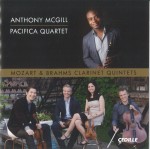 Mozart & Brahms – Clarinet Quintets
Mozart & Brahms – Clarinet Quintets
Anthony McGill; Pacifica Quartet
Cedille CDR 90000 147
Mozart and Brahms, more or less a century apart, wrote quintets for clarinet and string quartet during their most mature creative period. While liner notes for this latest recording draw interesting parallels between them, the pieces are quite distinct. More interesting than material similarities is that both works sprang from the composers’ admiration and affection for particular clarinetists. It is left to the contemporary performer to step into the shoes of Anton Stadler (Mozart) and Richard Muhlfeld (Brahms), to represent an aesthetic span of a century in the manner of one’s performance.
A greater challenge still is making the pieces sound new. Mozart’s K581 is perhaps too well-known for that. McGill and company keep tempi brisk, eschew vibrato, remain in tune; they even affect a Viennese waltz in the second trio. The clarinet tone is clear and yet warm: crystal velvet. The string playing is assured, all gut strings and clear understatement. It is nice to hear a different cadenza in the finale, uttered with flair. Still, I’m left feeling that what we have here is another fine rendition of a treasured yet worn part of the repertoire, even as I admire the heck out of the musicianship.
Brahms’ longer and darker work is more daunting for performer and listener alike. In Steppenwolf Hermann Hesse imagines an encounter with these composers in the afterlife: Brahms is a Jacob Marley figure (burdened by notes instead of chains); Mozart is the perfect Buddha, free of overstatement. Never mind! The opening of Op.115 is such a tremendous joy to hear in all its melancholic beauty, I forgive the composer his excesses. What a totally ravishing performance is given on this disc. Bittersweet romance blooms. The pacing is vital and flexible. Inner voices sing, hemiolas rock. The finale leads to ineluctable tragedy, beautifully. McGill opts for restraint for too much of the rhapsodic section of the adagio, but on the whole he and the quartet remain true to Brahms’ passionate expression. Buy this recording.



